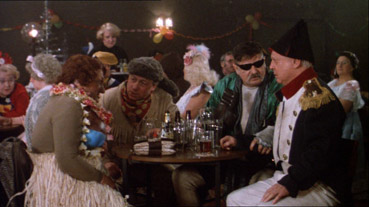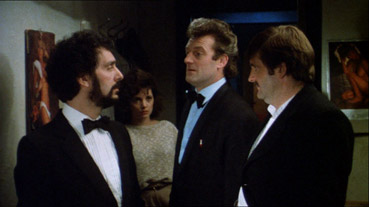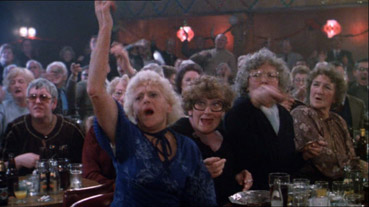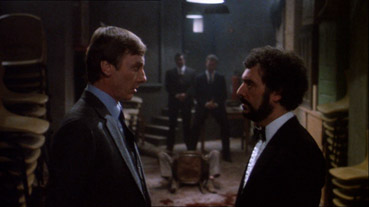|
Recently, I've been given cause to reflect on a year when great TV drama was very much writer led. The year in question was 1982, when two of the most important British TV drama series of modern times were aired. The first was the four-film Tales Out of School, written by David Leland, and the second was the six-episode Boys From the Blackstuff, the work of Alan Bleasdale. It's perhaps significant (though probably coincidental) that shortly prior to their respective big breaks, both men wrote two plays apiece for the BBC's flagship drama series, A Play for Today. Leland gave us Beloved Enemy and Psy-Warriors (both 1981), while Bleasdale wrote Scully's New Year's Eve (1978) and The Muscle Market (1981).
Between these two gigs, Bleasdale wrote a TV movie titled The Black Stuff, which chronicled the tragicomic misadventures of a group of Liverpudlian tarmac layers. Directed by Jim Godard (who also helmed The Muscle Market), it was was shot in 1978, but due to an internal dispute or scheduling issues within the BBC (the story varies depending on the source) was not broadcast until January 1980, when it attracted considerable praise and led to Bleasdale being commissioned to write a sequel series using the same characters. The result was Boys From the Blackstuff, which has become rightly celebrated as both a superb character drama and what the BFI neatly summarised as "TV's most complete dramatic response to the Thatcher era and a lament to the end of a male, working class British culture." This was followed by the too-little seen series Scully, developed from Bleasdale's first Play for Today entry, after which the author embarked on his first and to date only cinema feature, a film that remains one of the most engagingly quirky and darkly funny British films of the 1980s.

To call No Surrender offbeat is to invite a visit from the understatement police. Central to the tale is the previously unemployed Mike, who has landed a job managing a run-down Liverpool working man's club for shady businessman Mr. Ross. The club itself is located on wasteland that's patrolled by local kids, who demand money to protect your car from the vandalism that they will otherwise inflict. Actually getting inside the club proves a problem thanks to bluff but slow-witted doorman Bernard (pronounced Ber-nard – he was in the French Foreign Legion), who knows nothing of this new appointment and won't open the door. Once he does get inside, Mike meets pretty club dogsbody Cheryl, who has ambitions to be a singer, and soft-spoken hired goon Frank, who sidesteps every question and makes everything he says sound quietly sinister.
Elsewhere in the city, Irish protestant terrorist Norman Donaghue meets with former comrade turned successful businessman, Billy 'The Beast' McCracken, and uses veiled threats against his family to persuade Billy to hide him from the police for the night. On his tail are a pair of over-enthusiastic armed detectives, who kick down the wrong door and scare the life out of its two elderly occupants who are preparing for a night out. It's New Year's Eve, and unbeknown to Mike and his hapless staff, the club has been double-booked by two opposing groups of pensioners, one consisting of argumentative Catholics, the other made up of cantankerous Protestants.
And that's just the bare bones of the setup. Once the two groups enter the night club, the film walks a delicate but confident line between storytelling coherence and total anarchy: Norman hides out in the toilets, intermittently emerging to make coded phone calls to an unidentified contact; the two parties hurl abuse, sectarian songs and the occasional objects at each other; and blind former boxer Paddy repeatedly interrupts his heroic drinking to demand a score-settling fight with the uncooperative Billy. If that weren't enough, the evening's entertainment consists of camp but witless comedian, a neurotic magician, and a punk band who incur the wrath of the assembled pensioners with an angry song about impending death. And tucked away in the quiet seclusion of a locked back room, Mike's unfortunate predecessor is being tortured by Ross and three of his men.

There's a temptation to describe what unfolds as surreal, but that does its peculiar credibility a disservice. Kicking off with the caption "A typical night out (these days)," the film unfolds as a pitch-black but intermittently hilarious satire on Irish sectarianism, highlighting its absurdity by reducing the conflict to the level of a geriatric nightclub shouting match and a climactic punch-up in the grubby club toilet. Caught in the middle is the quietly bemused Mike, who observes the unfolding chaos with air of a man who is out of his depth but resigned to his fate, shadowed and intermittently aided by the willing but hopelessly dim Bernard.
As you might expect, No Surrender works primarily through its characters, with a savvy combination of smart writing, spot-on casting and perfectly pitched performances bringing humanity and humour to even the most seemingly absurd aspects of this odd night out. With director Peter Smith adopting a low key approach to the technical handling, it's Bleasdale who ends up wearing the auteurist hat, particularly as so many of the Blackstuff cast (fifteen by my count, including two of the leads) also have roles here. Leading the way is Michael Angelis, who is spot-on as Mike, his dry delivery and Liverpudlian twang as much part of his character as his dialogue and appearance. Almost stealing the film from under his nose is fellow Blackstuff alumni Bernard Hill, who play doorman Bernard as a man trying to hide his lack of comprehension behind a unstable wall of comically bullish bluff. Providing impressive support – if such a multi-character film can be said to differentiate between leading and secondary players – is the always commanding Ray McAnally as Billy McCracken, a pre-Edge of Darkness role for a young Joanne Whalley as Cheryl, old hand and Hammer favourite Michael Ripper as Paddy's Napoleon-dressed sidekick Tony, ex-Brookside regular Vince Earl as the smilingly menacing Frank, a small but memorable early part for then newcomer Ian Hart as a nervous mugger, and a brief appearance by Scully star Andrew Schofield as smart-mouthed guitarist Nocker ("Can you do Glen Miller?" Bernard asks the band, to which Nocker replies, "You mean fly off in the fog?"). And yes, that wide-eyed magician is none other than singer Elvis Costello.

There's not a weak performance here nor a character that doesn't make their mark in some small way, which has led to more than one commentator drawing parallels with Robert Altman's 1975 Nashville, with Bleasdale's world cast as the grubby underside of Altman's. A friend who lived in Liverpool during the 1980s has even assured me that, for all of its oddness, the one thing that always struck him about the film is its overriding air of realism, the establishment of which was a the key reason that director Smith (also a TV regular and the man behind the unjustly forgotten 1981 series Bread or Blood) was brought on board.
But ultimately the film belongs to Bleasdale and the superb ensemble cast (there's a strong sense throughout that parts were written with specific performers in mind), who quietly revel in scene after scene of dryly witty exchanges born of conflict and mutual misunderstanding. I'm always a little apprehensive about revisiting films that I once held in high regard after a twenty year gap, but No Surrender still holds up wonderfully, in part because the decline of writer-driven work in British cinema and television has ensured that nothing quite like it has come along since. It's in many ways typical of Bleasdale at his best, accurately reflecting the pessimism of the period for those being crushed under the Thatcherite foot, but still finding humour in even the dark and peculiar recesses of everyday life. Terrific.
You know that rush you get when you pop a DVD into the player of a film that you've never seen look anything but rough and the new digital transfer sparkles in a way that you could never have imagined? Well sorry, but you're not going to experience that here. Considering that it was shot on 35mm, that this is its first ever DVD release after years in the cultural wilderness, and that it was the sole feature written by one of the most important and talented television writers of the late 20th Century, you'd think better source material could have been found for the transfer here. Framed 1.78:1 (a currently popular crop from a 1.85:1 original) and anamorphically enhanced, the image is grubby-looking, grainy, lacking anything in the way of real shadow detail, and a notch or two short of the sharpness you'd expect for a film shot for 35mm theatrical release. Although largely clean, there are some scenes (including one involving the police and two suspects 68 minutes in), that are dancing with dust and small scratches, and there are a couple of frames missing on one shot of Angelis. On the plus side the picture itself is stable and largely consistent in its contrast and colour, which, though muted and subject to an earthy bias, is decently rendered.

Time has been kinder to the Dolby 2.0 mono soundtrack, which despite having a narrower range than the modern standard, is clear and damage free, and the noisier scenes play without a hint of distortion.
Making No Surrender (18:57)
Producer Mamoun Hassan and director Peter Smith are interviewed separately about the making of the film, from its initial conception through to its eventual release. Hassan does most of the talking, and paints an eye-opening picture of the difficulties he faced getting interesting projects (Gregory's Girl and Dance With a Stranger among them) funded back in the 1980s, and both men champion the skill of Bleasdale's writing.
Misunderstood and even dismissed by some at the time of its release (the film's composer Daryl Runswick still regards it as an unfunny and sometimes poorly performed failure), it's first DVD release should allow it's small but devoted following to grow. I heartily recommend the film, to which the single extra feature included here is a useful companion, but the sub-par picture quality does tend to let this long-waited release down. With no other version available, fans will have little option but to snap this one up, but the film really deserves better.
|